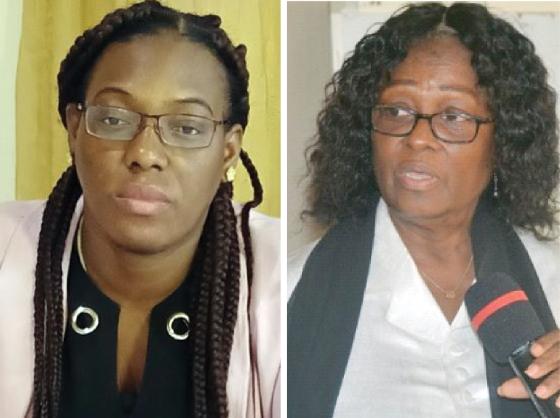Liberia: Sigh of Relief for NEC

PPCC Executive Director, Atty. Jargbe Roseline Nagbe Kowo, left, and NEC Chairperson Davidetta Browne Lansanah
… As PPCC approves ‘no objection’ request … the request is “hereby rendered for the NEC to award a contract to LAXTON Group in the amount of US$11 million (plus) for the supply and delivery of biometric voter registration equipment.”
The Public Procurement and Concessions Commission (PPCC) has finally given its nod of approval to the National Elections Commission to award a contract for the supply of biometric voting equipment and software for Liberia’s 2023 elections.
The approval is in response to a new request by the electoral body, seeking “no objection” to its decision to award Laxton, a Dutch company that claims on its website to have been trusted by over 300 government bodies around the world, to supply biometric voting equipment for next year’s elections.
Laxton Group was chosen by the NEC as the responsive bidder upon its review of the remaining bidders, considering responsiveness to the re-demonstration, capacity to prefinance, accessibility of supplier, and responsiveness to other indicated requirements in the bid.
“... the ‘No Objection’ is hereby rendered for the NEC to award the contract to LAXTON Group in the amount of US$11 million (plus) for the supply and delivery of biometric voter registration equipment, software, and materials for the 2023 Presidential and Legislative Elections,” said a letter from the PPCC Executive Director, Attorney Roseline Jargbe Kowo.
“The PPCC, upon overall review of NEC's submissions, accompanying documents and subsequent clarifications, hereby [orders] the NEC to ensure quality conformance for this contract package, given its critical nature and given that this is the first biometric voter registration pilot for Liberia.
The PPCC’s decision came after nearly four months of stalemate over the NEC’s earlier resolve to award EKEMP, a Chinese company which the NEC originally claimed had won the bid for the contract to supply the biometric equipment to kick-start the December 15 voter registration exercise for next year's elections.
EKEMP lost the right to the bid after PPCC withheld its grounds, twice denying the electoral body’s request for no objection. This was based on EKEMP’s inability to print a sample of the voter registration card on the spot as required by the NEC — and within the required timeframe — which showed uncertainty on the usage of its equipment and raised doubts about its effectiveness.
This rigmarole led to nearly four months of stalemate, setting back the electoral body’s plan to kick-off the conduct of voter registration exercises by December 15 through March 17.
The NEC’s plan to use a biometric voter-identification system, which would be the first of its kind in the country’s election history, is to prevent electoral fraud and chaos, which has marred previous elections.
The move comes as NEC has for years been under pressure to dash its optical manual registration (OMR) system. The OMR system, for many, does not improve the accountability and transparency of electoral processes and is usually tainted by controversy and mistrust.
The NEC’s planned use of the technology comes at a time when it is expected that more than two million Liberians will be eligible to vote in the 2023 presidential and legislative elections. It is anticipated that the biometric system will help the electoral body to better secure the voter roll and the integrity of the elections process: voter registration, voter verification, and the transmission of results.
Its use is intended to meet complex electoral challenges — arrest multiple registrations by a single voter and multiple voting, while supporting other mechanisms to avoid voter fraud and manipulation. The biometric voting system aims to provide a unique list of voters with zero duplicate voters.
Meanwhile the PPCC has disclosed that, as part of its safety measure, the NEC was asked to submit a draft contract reflecting proposed timelines and timeframes for the procurement deliverables for supply and delivery of the BVR equipment, software and materials, which they have met.
This came as Laxton, according to report, had informed the NEC procurement panel that it would deliver materials in 147 days (approximately April 2023) as of the date of award of contract, a period that appears to be too far out of the appropriate timeline for the smooth conduct of the 2023 voter registration exercise.
“That the PPCC subsequently, upon receipt of NEC's request, queried the NEC on its recommended bidder Laxton Group proposed delivery period and its alignment with the NEC’s new/adjusted proposed timeframes for delivery of the biometric equipment, software and materials indicated in its submissions; and the NEC subsequently, on November 23, provided information and clarifications on the issued query.”
“NEC’s evaluation report states that ESI, Laxton Group, Waymark/Mwetena were responsive to these re-demonstration requirements: data entry, printing of cards, deduplication, Software Flexibility, and added that Professional Services/HID Global was not responsive to the deduplication,” Kowo said.
